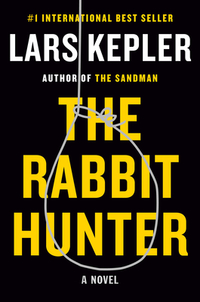The Rabbit Hunter by Lars Kepler
 Friday, August 28, 2020 at 8:01AM
Friday, August 28, 2020 at 8:01AM 
Published in Sweden in 2016. First published in translation in the UK in 2018. Published in a slightly different translation by Knopf on January 14, 2020.
The serial killer who baffles the police in The Rabbit Hunter wears long leather straps around his head that are strung with rabbit ears. So yeah, he’s weird, but serial killers are weird by nature. That’s probably why thriller writers love to imagine them, even though actual serial killers are relatively rare. If we must have another serial killer novel, at least we can have one in which the killer really ramps up the weirdness.
Sweden’s foreign minister was murdered while he was consorting with prostitutes. Saga Bauer, an officer who specializes in counterterrorism with the Security Police, investigates the killing. One of the prostitutes heard the killer say something that suggests other murders are on the horizon. Bauer thinks a suspected terrorist named Salim Ratjen might have relevant information about an apparent assassination plot, but Ratjen is in prison and unlikely to be cooperative.
Enter Joona Linda, who has starred in five earlier novels by the writing team that calls itself Lars Kepler. Linda begins this one in prison where he’s serving a sentence for assisting an escape and assaulting a guard. He’s looking forward to spending the rest of his life not being a police officer until the prime minister shows up with Bauer and asks Linda to get into Ratjen’s head.
The scene shifts frequently after the premise is established, although it shifts away from prison relatively quickly. Other murders occur as promised, but they don’t seem political. What ties them together is unclear, thus setting up the classic serial killer plot as the police try to figure out who will die next.
Linda is released from prison to continue the terrorism investigation despite his growing sense that the foreign minister’s slaying wasn’t an act of terrorism. Bodies drop and clues pile up until the real reason for the killings — the fact that links them and that explains the rabbit ears — is revealed.
The Rabbit Hunter is a longish book with a complex plot that delves deeply into the lives of privileged people who will likely die before the story ends. Some readers might think they deserve to die. Other readers might think that some of the characters, at least, are fairly sympathetic individuals who have atoned for their past. Either way, their fate shouldn’t be in the hands of a killer who wears rabbit ears, or even one who dresses more conventionally. Interestingly, the killer receives less character development than the victims, in part because his identity is concealed for most of the novel. We do, however, get a good sense of the kind of the shattered childhood that might produce a serial killer.
Kepler manufactures tension in the manner of a good film director. Kepler describes a crucial element of a scene, then describes something that might or might not be important — a shadow, a loud noise, tree branches moving without wind. Suspense builds but the reader is never quite sure whether something eventful is about to happen. Until the end, at least, when the action erupts. The ending doesn’t seem forced but it might be faulted for being a bit too karmic to be realistic. Still, with all the violence and death that ensues throughout the story, it would be hard to classify the finish as an entirely happy ending. It also comes with the touch of bitter irony. The ending might best be characterized as a respite from bleakness which, in Scandinavian thrillers, is the best for which a reader can hope. And in the tradition of Scandinavian thrillers, the respite is worth waiting for even if it’s a long time coming.
RECOMMENDED
 TChris |
TChris |  Post a Comment |
Post a Comment |  Lars Kepler,
Lars Kepler,  Sweden in
Sweden in  Thriller
Thriller 


